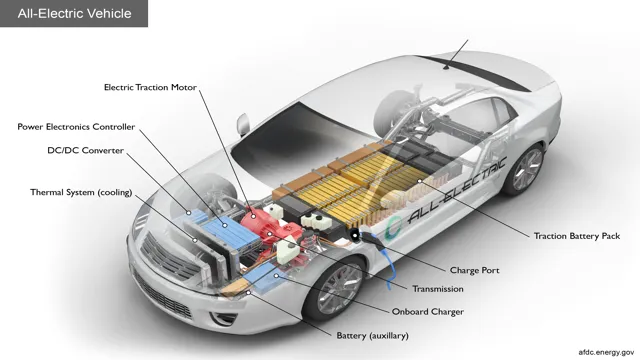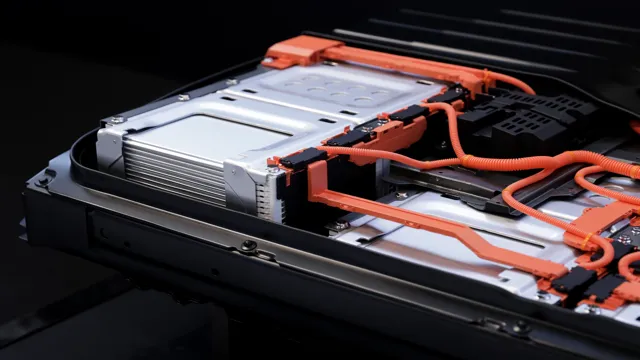Unleashing the Truth: Debunking the Myths About Electric Car Battery Radiation
Electric cars have become increasingly popular in recent years as people look for more environmentally friendly ways of commuting. However, with the increasing use of electric car batteries, the issue of radiation has been raised. Many are concerned about the potential dangers of radiation emitting from these batteries and its impact on human health.
Although electric car batteries do generate electromagnetic radiation, the level of radiation is generally low and considered to be safe. It is critical to examine the pros and cons of switching to electric cars and weigh their benefits against any potential risks.
Understanding Radiation
When it comes to electric car batteries, many people often wonder about the potential risk of radiation exposure. It is true that lithium-ion batteries utilized in electric vehicles do emit a small amount of radiation as they discharge energy. However, the amount of radiation emitted is so low that it poses no significant threat to human health.
In fact, the radiation levels emitted by electric car batteries are comparable to the amount of radiation you would be exposed to during everyday activities like cooking, watching TV or walking outside. Moreover, electric car batteries are designed in such a way that they minimize the risk of radiation exposure. So, if you are worried about radiation from your electric car battery, rest assured that it is not something you need to be concerned about.
What is Radiation?
Radiation is a natural and essential phenomenon that permeates our environment and affects our everyday lives in many ways. In simple terms, radiation is the energy that travels through space and matter in the form of electromagnetic waves or particles. It can come from various sources, including the sun, radioactive decay, and man-made technologies such as X-rays and nuclear power plants.
Radiation can be classified into two types, ionizing and non-ionizing, depending on their energy levels. While non-ionizing radiation like radio waves and microwaves are generally considered safe, prolonged exposure to ionizing radiation, such as gamma rays and X-rays, can have harmful effects on the human body. Therefore, understanding radiation and its various forms is crucial in safeguarding our health and well-being.

Types of Radiation
Radiation is a phenomenon that exists all around us. It is essentially the emission of energy, in the form of waves or particles, from sources such as the sun, electromagnetic fields, or radioactive materials. The types of radiation can be classified in several ways, but the most common are ionizing and non-ionizing radiation.
Ionizing radiation has higher energy and can penetrate materials such as skin, while non-ionizing radiation has lower energy and is often absorbed by the environment before it can even reach our bodies. Examples of non-ionizing radiation include visible light, radio waves, and microwaves, while ionizing radiation includes X-rays, gamma rays, and cosmic rays. Each type of radiation can affect human health differently, depending on the intensity, duration, and exposure route.
So, understanding radiation and its different types is crucial for protecting ourselves from potential harm.
Sources of Radiation
Radiation is all around us and it can be found in many different forms. Some sources of radiation are natural, such as cosmic radiation from the sun or radioactive materials found within the earth’s crust. Other sources of radiation are man-made, such as X-rays, nuclear power plants, and radioactive isotopes used in medical treatments and research.
It’s important to understand the different sources of radiation and the potential risks associated with exposure. Exposure to high levels of radiation can be harmful to human health, causing radiation sickness and increasing the risk of cancer. However, low levels of radiation are found in everyday life and pose little to no risk.
It’s all about understanding and managing the levels of exposure to ensure our health and safety.
Radiation in Electric Car Batteries
Electric car battery radiation is a hot topic among the environmentally-conscious. While electric cars are indeed more sustainable, questions remain about the radiation risks associated with the lithium-ion batteries used in electric vehicles (EVs). The truth is that, like most things in life, there are pros and cons to EV batteries.
While lithium-ion batteries do emit electromagnetic radiation, the amount is negligible and poses no serious health risks to humans. In fact, the radiation emitted by a cell phone is much higher than that of an electric car battery. That said, it’s always a good idea to take precautions when handling any type of electronic device, including EVs.
Overall, electric car batteries pose a minimal radiation risk, and the benefits of electric cars far outweigh any potential health concerns.
Materials Used in Electric Car Batteries
Electric car batteries are essential components of electric vehicles, and their popularity is rapidly increasing as people become more environmentally conscious. These batteries are made up of various materials, including lithium, cobalt, nickel, and graphite. However, one concern that people have about these batteries is the amount of radiation they emit.
While all batteries produce some radiation, electric car batteries contain very little. The level of radiation they emit is significantly lower than what you would be exposed to when using your cell phone or standing in the sun. Additionally, electric car batteries are designed to contain any radiation that is produced within the battery, making them perfectly safe for use in electric vehicles.
In fact, electric cars are among the safest vehicles on the road due to their advanced battery systems and safety features. So, if you’re worried about radiation from electric car batteries, you can rest assured that they are safe to use and won’t harm you or your loved ones.
Radiation Levels in Electric Car Batteries
Are you concerned about the radiation levels in electric car batteries? It’s a topic that’s been buzzing lately, with many people wondering if the batteries that power electric cars are safe. The reality is that while there may be some radiation exposure from electric car batteries, it’s not anything to worry about. In fact, the amount of radiation emitted from these batteries is so small that it is considered to be within safe limits.
The main source of radiation in an electric car is the lithium-ion battery, which is a type of rechargeable battery that is commonly used in modern electric vehicles. These batteries work by storing energy in a chemical reaction, which creates a small amount of heat and radiation. However, the level of radiation emitted from these batteries is very low and poses no harm to drivers or passengers.
So, if you’re worried about the radiation levels in electric car batteries, there’s really no need to be. Rest assured that these batteries are perfectly safe to use and are an excellent way to reduce your carbon footprint while driving.
Potential Health Risks
Many people have expressed concerns about the potential health risks associated with electric car battery radiation. This is because electric car batteries generate electromagnetic fields (EMFs), which some people believe could be harmful to human health. However, there is no conclusive evidence to support this idea.
While it is true that some studies have suggested a link between EMFs and cancer, the evidence is not strong enough to draw firm conclusions. Furthermore, electric car batteries are designed to emit very low levels of radiation, which are well below the limits set by international safety standards. So while it is always a good idea to take precautions when it comes to your health, there is really no need to worry about electric car battery radiation.
Effects of Radiation Exposure
When it comes to the potential health risks of radiation exposure, there are a number of factors to consider. The severity of the risks will depend on various factors, including the amount of exposure, the type of radiation, and the length of time someone was exposed. One of the main concerns with radiation exposure is the increased risk of cancer.
In fact, studies have shown that exposure to high levels of radiation can significantly increase the risk of developing certain types of cancer, including leukemia, thyroid cancer, and lung cancer. Other potential health risks of radiation exposure may include radiation sickness, skin damage, and even organ damage in severe cases. It’s important to take precautions when working with or around sources of radiation, such as wearing protective gear, using shielding, and limiting exposure time to help minimize the potential risks.
Regulations and Safety Standards
As the world becomes increasingly reliant on technology, many new products are introduced to the market every day. However, not all of them undergo the necessary safety tests and regulations to ensure that they are safe for human use. This can lead to potential health risks for consumers.
For example, certain electronic devices may emit harmful radiation that can put individuals at risk for long-term health problems such as cancer. In order to avoid such risks, it is important to research and purchase products from reputable manufacturers that have been certified to meet safety standards. It is also crucial for regulatory authorities to enforce stricter regulations to prevent the sale of hazardous products in the market.
By ensuring that safety standards are met, we can reduce the risks associated with new technologies and products.
Conclusion
In conclusion, the idea that electric car batteries emit harmful radiation turns out to be nothing but a bit of sparkless overreaction. While it’s understandable to want to be wary of new technologies, rest assured that these batteries are as safe as they are eco-friendly. So the only thing you’ll need to worry about is not getting too amped up over how cool they are!”
FAQs
What are the radiation emissions from electric car batteries?
Electric car batteries emit extremely low frequency (ELF) radiation, which is similar to the radiation emitted from smartphones and laptops.
Is it safe to sit in an electric car for extended periods of time due to radiation?
Yes, it is safe to sit in an electric car for extended periods of time as the ELF radiation emitted by the battery is not harmful to human health.
How do electric car batteries compare to traditional car batteries in terms of radiation emissions?
Electric car batteries emit significantly less radiation than traditional car batteries, which contain lead and acid and can emit harmful fumes.
Are there any potential long-term health effects from exposure to radiation from electric car batteries?
No, there are no known long-term health effects from the ELF radiation emitted by electric car batteries, as it is not strong enough to cause harm to human cells.





